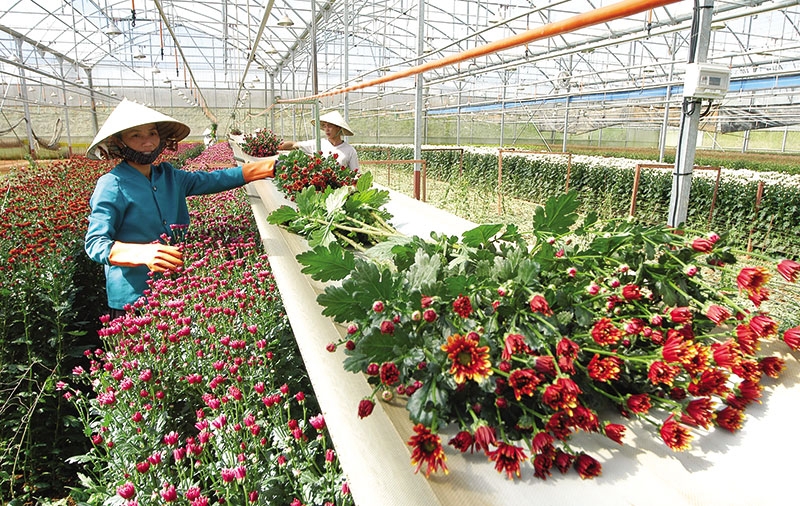Vietnam aims to facilitate agriculture investment
 |
| In order to develop the agricultural sector, Vietnam needs more investors to bring in capital and high-tech projects, Photo: Le Toan |
Last Monday, in the tranquil and picturesque Central Highlands city of Dalat, a rendezvous point for many high-tech agricultural projects within Vietnam, Prime Minister Nguyen Xuan Phuc asked ministries, relevant government agencies, and localities to take drastic action in order to revitalise the agricultural sector, which is now thirsty for investment. PM Phuc stated that joint efforts are needed from the government and the business community to turn Vietnam into one of the world’s top producers and processors of high-quality farm produce.
“Over the next 10 years, Vietnam must become one of the 15 most agriculturally developed countries in the world, with agricultural product processing ranked in the top 10,” PM Phuc told the national-level conference on boosting agricultural investment. “Vietnam must be an agriculturally intensive processing centre of the world and a logistics centre for global agricultural trading.”
To make this dream a reality, the prime minister has assigned the Ministry of Planning and Investment (MPI) to compile a directive on agricultural investment attraction for the governmental approval.
PM Phuc also required ministries, relevant government agencies, and localities to strictly implement Decree No.57/2018/ND-CP, issued in April, on the mechanisms and policies required to attract investment into agricultural and rural development.
Decree 57 covers many types of new incentives regarding the rents of land and water surfaces, credit, transfer and the application of high-technology, human resources training, market expansion, and investment into the manufacturing of agricultural machinery and equipment.
For example, under the decree, the government will finance a maximum of VND15 billion ($664,000) for a project processing agricultural produce. The finances will be used to build its waste treatment infrastructure systems as well as for transport, electricity, water, workshops, and equipment required for the project.
PM Phuc also ordered that 50 per cent of agricultural and rural administrative procedures be removed in favour of people and the business community. Further fuelling the agricultural sector, the prime minister also requested the amendment of Decree No.55/2015/ND-CP on credit policies for agricultural and rural development, so as to raise maximum loan value without increasing collateral requirements for individuals and households. The amendment will expand the list of beneficiaries of the credit policy in the field of high-tech agriculture, and allow for the use of assets made from the loans of high-tech agricultural projects as collateral.
“It is an urgent task to complete the legal framework for the sector, as agriculture has enormous potential for growth,” PM Phuc stressed. “A number of Vietnamese companies are now focusing on agricultural investment, an encouraging trend as well as a testament to the development potential of Vietnam’s agricultural sector.”
Vietnam has become the world’s fifth-largest exporter of agro-food commodities such as rice, coffee beans, tea, cashew nuts, black pepper, rubber latex, and cassava, as well as aquatic products.
Over the past few years, local and foreign companies have been actively implementing high-tech agricultural projects in Vietnam, but many of them have yet to receive special incentives from the government. For instance, TH Group plans to invest hundreds of millions of dollars in high-tech agricultural projects nationwide, with a focus on producing fresh milk, organic vegetables, herbs, and fruit.
The group is currently developing its $53 million high-tech dairy farm in the central province of Phu Yen, while also developing two other dairy farming and fresh milk processing facilities in Ha Giang and Thanh Hoa provinces with the total investment capital of $287 million.
In another case, steel maker Hoa Phat Group has entered into egg production by developing two chicken farms in Phu Tho and Dong Nai provinces.
Nafood Group also kicked off the construction of a $9 million facility in the northern mountainous province of Son La to process export-oriented vegetables and fruit, including condensed passion fruit.
Nguyen Dang Quang, chairman of Masan Group, asked the government urgently to create policies to manage and develop near-shore water resources. To unlock the full potential of Vietnam’s long coastline, the Vietnamese government should formulate a clear strategy with an emphasis on sustainable farming.
Over the past years, foreign investors have also come to Vietnam to engage in large-scale agricultural projects. These include Cargill, CJ, CP, and Mavin Austfeed. Foreign direct investment (FDI) in the country’s agricultural sector, which holds only 1 per cent of the country’s total registered FDI capital, is largely focused on producing animal feed and processing farm produce.
The Vietnamese agricultural sector currently has a total of about 49,600 domestic and foreign-invested enterprises.
What the stars mean:
★ Poor ★ ★ Promising ★★★ Good ★★★★ Very good ★★★★★ Exceptional
 Tag:
Tag:
Related Contents
Latest News
More News
- Manufacturing growth remains solid in early 2026 (February 02, 2026 | 15:28)
- EU and Vietnam elevate relations to a comprehensive strategic partnership (January 29, 2026 | 15:22)
- Vietnam to lead trade growth in ASEAN (January 29, 2026 | 15:08)
- Japanese business outlook in Vietnam turns more optimistic (January 28, 2026 | 09:54)
- Foreign leaders extend congratulations to Party General Secretary To Lam (January 25, 2026 | 10:01)
- 14th National Party Congress wraps up with success (January 25, 2026 | 09:49)
- Congratulations from VFF Central Committee's int’l partners to 14th National Party Congress (January 25, 2026 | 09:46)
- 14th Party Central Committee unanimously elects To Lam as General Secretary (January 23, 2026 | 16:22)
- Worldwide congratulations underscore confidence in Vietnam’s 14th Party Congress (January 23, 2026 | 09:02)
- Political parties, organisations, int’l friends send congratulations to 14th National Party Congress (January 22, 2026 | 09:33)





















 Mobile Version
Mobile Version